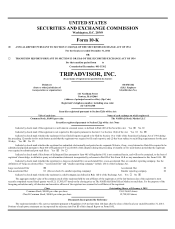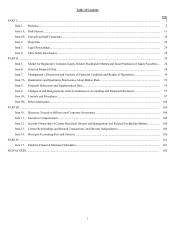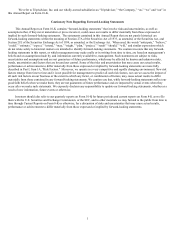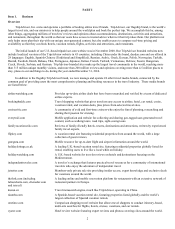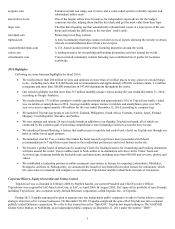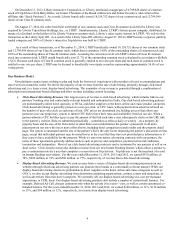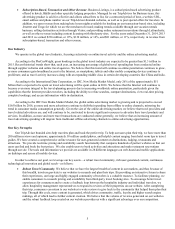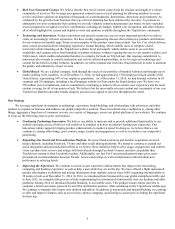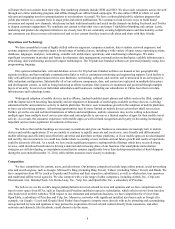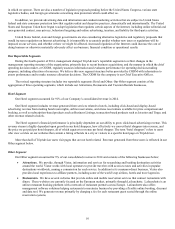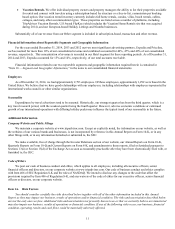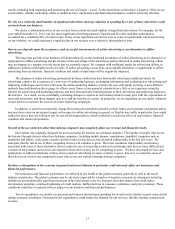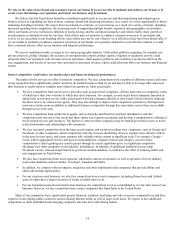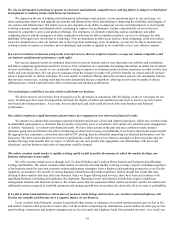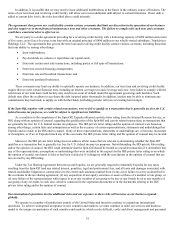TripAdvisor 2014 Annual Report Download - page 19
Download and view the complete annual report
Please find page 19 of the 2014 TripAdvisor annual report below. You can navigate through the pages in the report by either clicking on the pages listed below, or by using the keyword search tool below to find specific information within the annual report.9
In the competition to attract users, we rely on our ability to acquire traffic through offline brand recognition and brand-direct
efforts such as television, email and online search, whether unpaid or paid. Unpaid search is sometimes referred to as SEO, which is
the practice of developing websites with relevant and current content that rank well in “organic,” or unpaid, search engine results.
SEO can be affected by a number of factors including competitive site content, changes to our website architecture and page designs,
changes to search engine ranking algorithms, or changes to display ordering in search engine results such as preferred placement for
internal products offered by search engines. SEM is a form of Internet marketing that involves the promotion of websites by
increasing their visibility in search engine results pages through the use of paid placement, contextual advertising, and paid inclusion.
SEM is a competitive marketplace with competitors continually updating their traffic acquisition strategies and economic models
across a large number of keywords and markets.
Competition for Advertisers
We compete for travel-related advertising budgets with large, established search engines with significantly greater resources
than we have, such as Google, Bing, and Yahoo!, as well as online media companies and ad networks, offline advertising sources,
such as television and print media. These competitors have large client bases and significantly greater resources than we have and
expertise in developing online commerce and facilitating internet traffic are creating inroads into online travel. Competition from these
parties could cause us to lose advertising customers or shares of advertising expenditures. For example, Google has launched “Hotel
Finder”, a search tool that enables users to search and compare hotel accommodations based on parameters set by users and has, at
times, placed the Google supplier websites or its own search engine at or near the top of hotel-related search results. In addition,
Microsoft has launched Bing Travel, which searches for hotel reservations and air fares online and predicts the best time to purchase
them. If Google, Bing or any other leading search engines refer significant traffic to these or other travel services that they develop in
the future, or otherwise favor supplier websites or other travel service websites over other online travel sites, including us, it would
likely become more difficult and expensive for us to generate traffic to our websites and therefore maintain or grow our market share.
Certain of the companies we do business with are also our competitors. The consolidation of our competitors and partners,
including Expedia (through its investment in Trivago) and Priceline (through its acquisition of Kayak and OpenTable), may affect our
competitiveness and partner relationships. As the market evolves for online travel content and the technology supporting it, including
new platforms such as smartphone and tablet computing devices, we anticipate that the existing competitive landscape will change and
new competitors may emerge.
Intellectual Property
Our intellectual property, including patents, trademarks, copyrights, domain names, trade dress, proprietary technology and
trade secrets, is an important component of our business. We rely on our intellectual property rights in our content, proprietary
technology, software code, ratings indexes, databases of reviews and forum content, images, videos, graphics and brands. We have
acquired some of our intellectual property rights through licenses and content agreements with third parties. These licenses and
agreements may place restrictions on the use of our intellectual property.
We protect our intellectual property by relying on our terms of use, confidentiality procedures and contractual provisions, as
well as on international, national, state and common law rights. In addition, we enter into confidentiality and invention assignment
agreements with employees and contractors, and confidentiality agreements with other third parties. We protect our brands by
pursuing the trademark registration of our core brands, such as TripAdvisor and the Owl Logo, maintaining our trademark portfolio,
securing contractual trademark rights protection when appropriate, and relying on common law trademark rights when appropriate.
We also register copyrights and domain names as deemed appropriate. Additionally, we protect our trademarks, domain names and
copyrights with the use of intellectual property licenses and an enforcement program.
We have considered, and will continue to consider, the appropriateness of filing for patents to protect future inventions, as
circumstances may warrant. However, many patents protect only specific inventions and there can be no assurance that others may not
create new products or methods that achieve similar results without infringing upon patents owned by us.
Government Regulation
We are subject to a number of United States federal and state and foreign laws and regulations that affect companies conducting
business on the Internet, many of which are still evolving and being tested in courts, and could be interpreted in ways that could harm
our business. These may involve user privacy, libel, rights of publicity, data protection, content, intellectual property, distribution,
electronic contracts and other communications, competition, protection of minors, consumer protection, taxation and online payment
services. In particular, we are subject to United States federal and state and foreign laws regarding privacy and protection of user data.
Foreign data protection, privacy, and other laws and regulations are often more restrictive than those in the United States. United
States federal and state and foreign laws and regulations are constantly evolving and can be subject to significant change. In addition,
the application and interpretation of these laws and regulations is often uncertain, particularly in the new and rapidly-evolving industry


